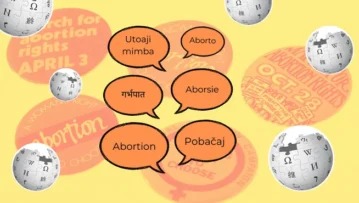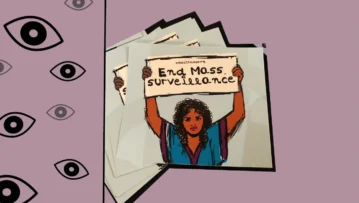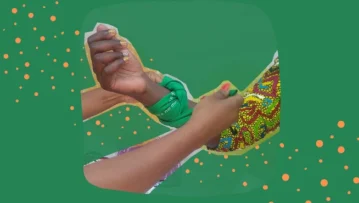
The Digital Rights Asia-Pacific Assembly (DRAPAC23) was convened by EngageMedia with the DRAPAC steering committee and various partners, in picturesque Chiang Mai, Thailand, from 22 to 26 May 2023. With over 160 sessions, the conference intended to build momentum, reconnect, and boost collaborations, after the pandemic forced us all to stay connected with our digital communities from afar.
Thailand, the only Southeast Asian country never to have been colonized by a European power, is an intricate and exquisite amalgam of colors, textures, fragrances, flavors, and dreamy landscapes. At its core, DRAPAC23 was similar to this generous land that received hundreds of digital rights activists, advocates, campaigners, technologists, academics, journalists, media-makers, artists, designers (and more!) from across the globe, especially the Asia-Pacific region.
Staying up to date with the complex realities and struggles in this part of the world doesn’t come effortlessly for a South American person like myself. The histories of both regions intersect and then diverge like zigzagging rivers on a map until we reach this point where somehow we co-exist in this global plaza that the internet is. But where do we converge in the digital rights scene? What are some of the most pressing issues in Asia-Pacific and South America? Are we connected yet distant, or are we closer in digital rights struggles than it seems at first sight?
Trailblazer folks seeking gender justice

I quickly noticed that womxn’s participation at DRAPAC23 was higher than in any other digital rights conference I attended. Gender-oriented sessions were many and varied—due perhaps to womxn’s experiences online being manifold and complex. These sessions were enclaves for womxn at DRAPAC23 to fiercely point out the pain points as digital human beings and propose radically different futures.
As part of the feminist conversations, our sisters from Numun Fund (the first dedicated fund for feminist technology in and for the Global South, co-created in partnership with Whose Knowledge?) brought the feminist tech and open source perspective through a panel and lots of scheming and community building in the hallways. PurpleCode Collective, Body & Data, and The Bachchao Project (among others!) pushed forward the feminist internet imaginary and highlighted issues of OGBV, harassment, digitization of identities, and queering social media.
I also enjoyed other conversations boldly led by womxn. Shmyla Khan (Digital Rights Foundation Pakistan) and Shyam Krishna (Alan Turing Institute), for example, discussed decolonizing data for data justice, emphasizing how data mining is an extractive, neocolonial, and capitalist practice. Also, journalists and activists from Palestine, Afghanistan, Egypt, and Pakistan uncovered women’s digital rights violations in authoritarian regimes during a courageous and deeply moving session.
Resisting social control and repression on the internet

Freedom House maintains that freedom in the Asia-Pacific region has improved slightly in 2022. Still, the region is not immune to authoritarianism, dictatorships, autocracy, and deterioration of human rights. Most notably, the 2021 Myanmar military coup led to rising violence and brutal repression in the country, which was followed by a significant decline in internet freedom. «As part of its attempt to crush dissent and maintain power, the military junta shut down internet service, blocked social media platforms and websites, seized control of the telecommunications infrastructure, and ramped up intrusive surveillance,» explains the organization.
In this context, it doesn’t come as a surprise that numerous conversations at DRAPAC23 revolved around internet shutdowns weaponization, online freedom of expression and assembly, harassment and hate speech, digital security threads, surveillance and anonymity, privacy and safety, dis/misinformation and fake news, and other forms of repression through digital rights.
But, despite the winding terrain that the internet seems at times, people in the region continue to use digital tools to organize and voice opposition to injustices. I was astounded to learn the stirring ways in which organizations, activists, and communities from Malaysia, the Mekong region, the Philippines, Hong Kong, Cambodia, Taiwan, India, Thailand, Sri Lanka, Bangladesh, Indonesia, West Papua, and especially Myanmar are countering hate speech, monitoring freedom and censorship, enhancing community-led moderation on Wikipedia, conducting safety trainings, confronting cross-border disinformation targeting religious and ethnic minorities, and using open source fact-checking bots.
Solidarity, community building, and organizing online

Solidarity with Myanmar was the leitmotif at DRAPAC23. Attendees could show their support and learn about the struggle in the country through a wall to leave messages, a photographic exhibition, movie nights, and sessions to help build a support community and deepen the connections with local networks.
Alongside a sense of regional solidarity, the use of digital technologies for social change was very present. Digital media in general, and social media in particular, surfaced as critical tools for archiving and documenting the different ways of social organizing in the region. I particularly loved the connections between these technologies and very real situated struggles such as climate justice. The panel on co-creating digital safe spaces for women environmental defenders, organized by EWMI and Asian Indigenous Peoples Pact, is the perfect example.
Community radio emerged at DRAPAC23 as a critical communications means for people, especially in Myanmar, who face digital rights repressions like internet shutdowns and espionage. Analog radio is a simple low-tech magic wand that connects communities and territories through hardships and joyfulness. Today, with virtual technologies, digital radio adds another layer into the network by connecting diasporic communities as well. One thing I love about radio is that it allows a community to create its own content without the limitations and regulations of proprietary platforms. Invariably, this content is a beautiful rupture of harmful narratives that are frequently found online, and is instead affirming, positive, nurturing, and regenerative to the community. I was therefore very happy to see that building positive narratives and dismantling harmful ones was also part of the conversations at DRAPAC23.
A call for sustainability and reparations

Activists, collectives, and small organizations from otherized/minoritized communities know very well how to do much with very little. Due to scarcity of funds, too often voluntary precarious work ends up holding the heavy lifting of our dreams and projects. DRAPAC23 was a chance to reflect deeply on how we can move from aid to reparations. How can we shift the power structures around grantmaking to really meet the expansive needs of marginalized communities? How can digital communities across the Global Majority world stop depending on Global North funding? What does it mean to have English as the primary language to access funds?
My favorite session about reparations was “Connecting the dots: Feminist tech organizing in Asia Pacific” held by Numun Fund. The gathering was key to thinking about how to transform grantmaking into a horizontal, open, feminist, and just process. It was also an invitation to better understand the needs of feminist tech communities worldwide, and to imagine what our work would look like if we weren’t tied to economic constraints: what are our wildest dreams to change the internet?
Closure: Standing in South-South sisterhood

Not all sessions at DRAPAC23 were equally inspiring or exciting to me. Some panels felt out of sync with the rest of the event (for example, the ones by the U.S. Department of Homeland Security representatives on digital security and copyright infringement), some sessions from NGOs focused more on presenting reports or other outcomes of their work than on bosting conversations, and in a few panels a western person sitting at the intersections of many privileges was unmindfully lecturing about regional digital rights issues.
Nonetheless, DRAPAC23 was one of the most welcoming, powerful, blossoming, and beautiful tech conferences I’ve ever attended. Aware of my outsiderness, I brought myself in a South-South sisterhood spirit, and I remained open to connecting and reconnecting with fellow feminists, media activists and digital rights advocates. I learned and unlearned from the incredible communities from Asia-Pacific, and was inspired by the stories of grassroots activists and community organizers.
Through the conversations at DRAPAC23, I was reaffirmed in thinking that the Decolonizing the Internet and Knowledge/Language Justice framework that we at Whose Knowledge? think deeply about (and practice daily with our communities), is a bridge that connects digital rights struggles across regions. It acts by bringing to the front the impact our shared colonial histories have over our present digital lives, and the historical and ongoing power structures around tech design, development and governance that are detrimental to marginalized communities.
I believe the building of an internet where we can be our full selves, safely and joyfully, is the foremost shared effort between the Asia-Pacific and South America regions.





